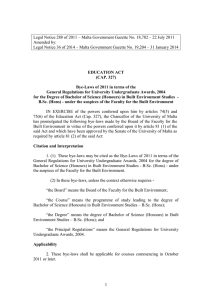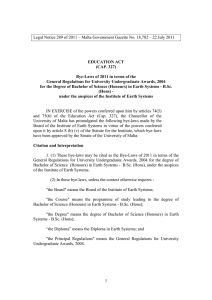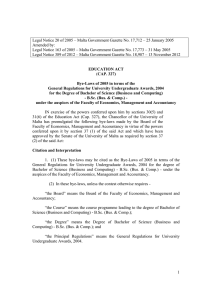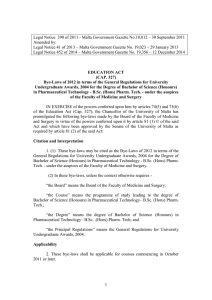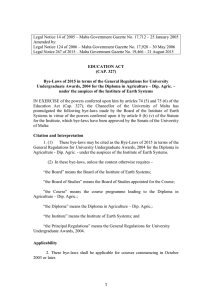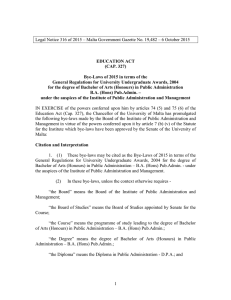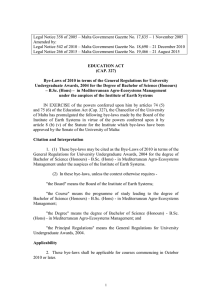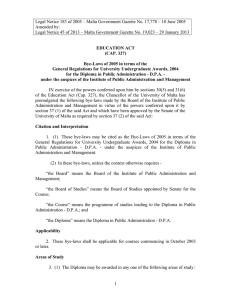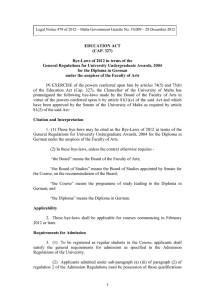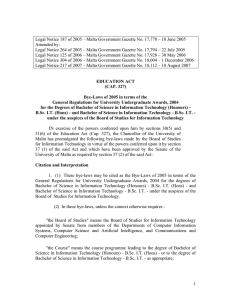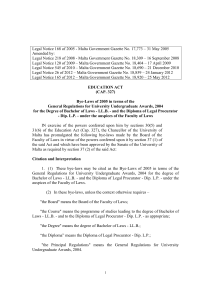Legal Notice 388 of 2007 – Malta Government Gazette No.... Amended by:
advertisement
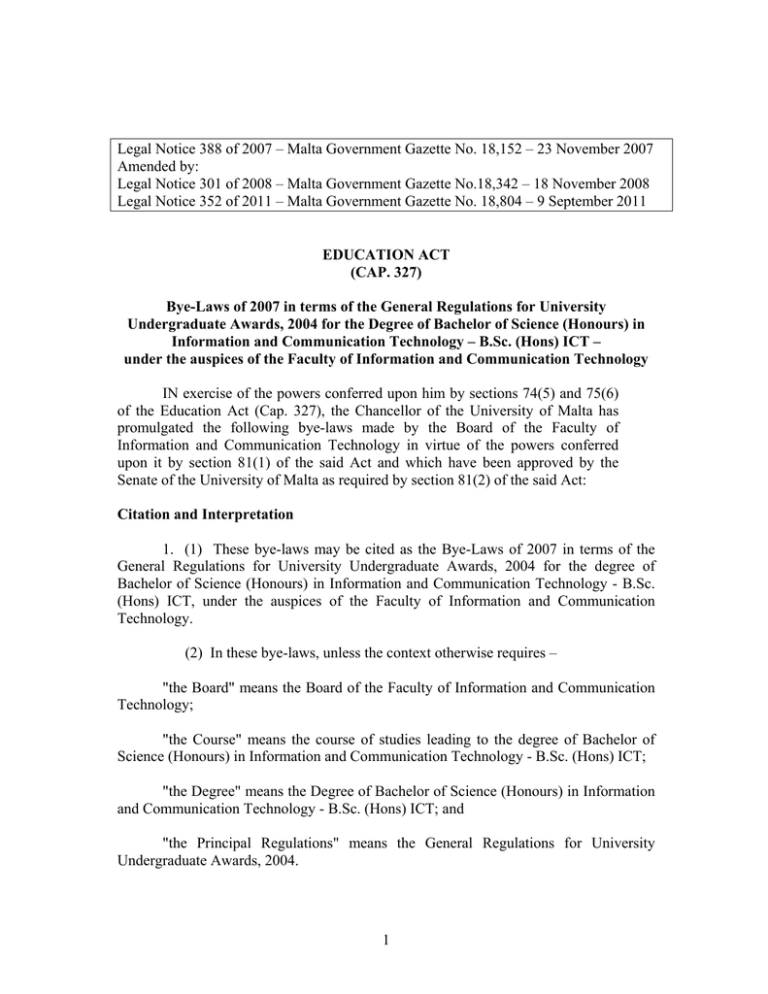
Legal Notice 388 of 2007 – Malta Government Gazette No. 18,152 – 23 November 2007 Amended by: Legal Notice 301 of 2008 – Malta Government Gazette No.18,342 – 18 November 2008 Legal Notice 352 of 2011 – Malta Government Gazette No. 18,804 – 9 September 2011 EDUCATION ACT (CAP. 327) Bye-Laws of 2007 in terms of the General Regulations for University Undergraduate Awards, 2004 for the Degree of Bachelor of Science (Honours) in Information and Communication Technology – B.Sc. (Hons) ICT – under the auspices of the Faculty of Information and Communication Technology IN exercise of the powers conferred upon him by sections 74(5) and 75(6) of the Education Act (Cap. 327), the Chancellor of the University of Malta has promulgated the following bye-laws made by the Board of the Faculty of Information and Communication Technology in virtue of the powers conferred upon it by section 81(1) of the said Act and which have been approved by the Senate of the University of Malta as required by section 81(2) of the said Act: Citation and Interpretation 1. (1) These bye-laws may be cited as the Bye-Laws of 2007 in terms of the General Regulations for University Undergraduate Awards, 2004 for the degree of Bachelor of Science (Honours) in Information and Communication Technology - B.Sc. (Hons) ICT, under the auspices of the Faculty of Information and Communication Technology. (2) In these bye-laws, unless the context otherwise requires – "the Board" means the Board of the Faculty of Information and Communication Technology; "the Course" means the course of studies leading to the degree of Bachelor of Science (Honours) in Information and Communication Technology - B.Sc. (Hons) ICT; "the Degree" means the Degree of Bachelor of Science (Honours) in Information and Communication Technology - B.Sc. (Hons) ICT; and "the Principal Regulations" means the General Regulations for University Undergraduate Awards, 2004. 1 Applicability 2. These bye-laws shall apply to courses commencing in October 2007 or later. Areas of Study 3. (1) The Degree shall be awarded in any area of study related to Information and Communication Technology from the following: (a) (b) (c) (d) (e) (f) Computer Information Systems; Computer Science and Artificial Intelligence; Communications and Computer Engineering; Information and Communication Technology; Microelectronics; or any other ICT area of study as stipulated by the Board.” (2) The areas of study offered in any particular year and the combinations that may or may not be chosen together shall be published by the Board before the commencement of the Course. (3) The combinations offered may also include subsidiary areas of study approved by the Board from outside the Information and Communication Technology areas of study. A subsidiary area of study shall be assigned 36 credits. Special Course Requirements for Admission 4. To be registered as regular students in the Course, applicants shall: either: (a) satisfy the general requirements for admission as specified in the Admission Regulations of the University and be in possession of: (i) passes at Advanced Matriculation Level at Grade C or better in Pure Mathematics and in one of the following subjects: Applied Mathematics, Biology, Chemistry, Computing, Economics, English, Information Technology, Music, Philosophy, and Physics; and 2 (ii) a pass at Intermediate Matriculation Level in Physics (if not offered at Advanced Matriculation Level); and (iii) a pass at Intermediate Matriculation Level in Computing or Information Technology (if not offered at Advanced Matriculation Level) is also required for all areas of study except Communications and Computer Engineering, and Microelectronics; or (b) be in possession of: (i) five passes in the Secondary Education Certificate Examination, including English Language and Maltese; and (ii) a pass in Systems of Knowledge at Intermediate Matriculation Level; and (iii) a pass at Advanced Matriculation Level at Grade C or better in Pure Mathematics or at a corresponding level of other examinations recognised by Senate for the purpose of the Admission Regulations; and (iv) any one of: (1) the Higher Technician Diploma of the City and Guilds of London Institute Course No. 8000 in Electrical Engineering; (2) the Diploma in Industrial Electronics, with Credit, of the Fellenberg Training Centre; (3) the Advanced Diploma of the City and Guilds of London Institute Course No. 7235 in Applied Information Technology; (4) the MCAST-BTEC Higher National Diploma (HND) in Computing; or (5) any other qualification from a recognised institution considered by the Board to be equivalent to any of (1), (2), (3) or (4), Provided that: (a) Students who lack a grade in only one of the subjects of the Special Course Requirements required at Advanced Matriculation Level indicated in paragraph (a) of this bye-law shall be admitted under those conditions as the Board may impose to compensate for the missing element. If, by the end of the first year, such students do not 3 successfully complete all the requirements to progress regularly to the second year of the Course, they shall be required to withdraw from the Course and shall neither be entitled to repeat the year nor to progress conditionally as normally permitted under the Principal Regulations; and (b) If a subsidiary area of study outside the Information and Communication Technology area of study is chosen, applicants must also satisfy any special course requirements relevant to that area. Course Duration 5. The Course shall extend over a period of three years of full-time study or its equivalent in part-time study. Course Programme 6. (1) The Course shall consist of study-units to which 180 credits shall be assigned. (2) The Board shall publish the course programme for the Degree and the programme of studies for each area of study taken on its own or in combination with another, before the commencement of each Course, following the approval of Senate. Subject to changes that the Board may, with the approval of Senate, be constrained to make, students are bound to follow the study-units and obtain the credits as indicated in the course programme and in the programmes of studies of the areas of study they are following for the Degree. (3) The Board shall draw up a catalogue of all the study-units on offer. The catalogue shall indicate the level, code, title, description and type of each study-unit, the credits assigned to each study-unit, and the methods of teaching and assessment. The Board shall publish the catalogue prior to the commencement of each Course, following the approval of Senate. 7. Notwithstanding the provisions of regulation 45 of the Principal Regulations, in any year of the Course, students shall not be awarded more than 12 credits for studyunits passed by compensation and if necessary the students shall be required to choose which study-unit/s of the eligible study-units are to be considered as passed by compensation, to a maximum value of 12 credits. 8. Students who successfully complete the programme of studies for the first year of the Course to which 60 credits have been assigned and opt not to proceed with the Course or, having proceeded, do not successfully complete the Course, shall be entitled to the Diploma in Information and Communication Technology. 4 9. Students who successfully complete the programme of studies for the first two years of the Course to which 120 credits have been assigned and opt not to proceed with the Course or, having proceeded, do not successfully complete the Course, shall be entitled to the Higher Diploma in Information and Communication Technology. Classification of the Award 10. The Final Weighted Average Mark for the classification of the Degree shall be based on the results obtained in the Course, each year of which shall be weighted as follows: First Year Average Mark Second Year Average Mark Third Year Average Mark 20% 40% 40%. 5
